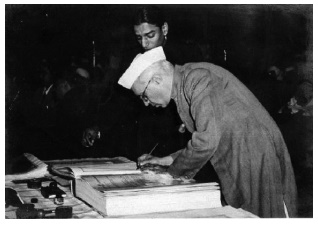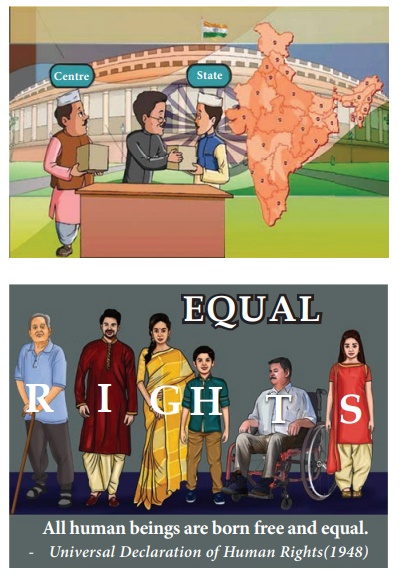Chapter: 12th Political Science : Chapter 1 : Constitution of India
Salient Features of Indian Constitution
Salient Features of Indian Constitution
Longest Written Constitution: The Indian Constitution
is considered to be the longest written constitution in the world. It contains
different provisions for states and centre and their inter-relationship. The
framers of the Constitution have borrowed provisions from several sources and
several other Constitutions of the world. The Indian Constitution contains the
detailed list of individual rights as fundamental rights, directive principles
of state policy and details of administrative procedures.

A unique blend of rigidity and flexibility: Indian Constitution may be called rigid as well as flexible based
on its amending procedure.
Sovereign, Socialist, Secular, Democratic and Republic: Democracy in India means its people govern India
through their representatives elected by the universal adult franchise. India
as a sovereign country means it manages its internal and external affairs
freely without the interference of any external factors. The term socialist was
added to the Indian Constitution through the 42nd Amendment in 1976. In India,
we follow the mixed model of the socialist and capitalist economy. Secularism
in Indian context means that it recognizes all religions equally without having
any state religion. Republic in the Indian context means the head of the state
in India is elected and not the monarch.
Parliamentary System of Government: Parliament controls the functioning of the Council of
Ministers, and hence it is called the Parliamentary system. In a parliamentary
system of government, (i.e.) the executive is responsible to the legislature
and remains in power only when it enjoys the confidence of the majority
legislators.
Single Citizenship: Indian Constitution has the provision for
single citizenship provided by the union and recognized by all the states
across India.
Citizenship identifies those who are the lawful
members of a country. The Citizenship Act, 1955 regulates the determination and
acquisition of citizenship after the adoption of the Indian Constitution. The
Indian Constitution provides for citizenship by birth, descent, registration,
naturalization and by incorporation of territory. The Constitution also provides
for renunciation and termination of citizenship under certain circumstances.
The Constitution contains provisions regarding registration of Overseas
Citizens of India and their rights.
The Citizenship (Amendment) Bill, 2015 was
introduced in Lok Sabha on 27th February, 2015 that amends the Citizenship Act,
1955.
The Act allows a person to apply for citizenship by
registration or naturalization if they fulfill specific qualifications. A
person may apply for a certificate of naturalization if they have resided in
India or have served the Government in India for twelve months immediately
preceding the date of application. The Bill allows the Central Government to
relax the requirement of twelve months stay or service if extraordinary
circumstances exist.
Universal Adult Franchise: The universal adult
franchise, which operates with the principle of ‘one person one vote.’ All
Indians who are eighteen years of age or above is entitled to vote in the
elections. There is no discrimination in voting rights for the citizens of
India based on caste, religion, gender, race or status.
Independent and Integrated Judicial System: In India, the judicial system is an autonomous organ kept free
from the influence and intervention of the executive and the legislature in exercising
its functions. The integrated Indian judicial system has the Supreme Court at
the apex, the high courts and lower courts are subordinate to it.
Fundamental Rights:
The Constitution of India asserts the basic
principle that every individual is entitled to enjoy certain essential rights.
The provisions for Fundamental Rights are mentioned in Part III of the Indian
Constitution. Fundamental Rights are categorized into six heads; Firstly Right
to Equality, Secondly Right to Freedom, Thirdly Right against Exploitation,
Fourthly Right to Freedom of Religion, Fifthly Cultural and Educational Rights
and lastly Right to Constitutional Remedies. Initially there was a provision
for Right to Property under Article-31 which was also a Fundamental Right. The
44th Amendment Act, 1978 had omitted Right to Property from the Fundamental
Rights Part and added it as Article 300A and therefore is considered as a legal
right.

Fundamental rights provided in Part of the Indian
Constitution are judicially enforceable, thereby the individual can move the
judiciary, if there is a violation on any of these rights. The right to move
straight to the Supreme Court for the enforcement of fundamental rights has
been guaranteed under Article 32 that is named as Right to Constitutional
Remedies. Fundamental rights in India are, however, not absolute and rational
restrictions can be imposed keeping in view of the security requirements of the
state. It ensures political justice for the people.
“Right to Education -The Indian Constitution (Eighty - Sixth Amendment)
Act, 2002 inserted Article 21-A in the Constitution of India to provide
free and compulsory education to all children in the age group of six to
fourteen years as a Fundamental Right in such a manner as the State may, by
law, determine. The Right of Children to Free and Compulsory Education (RTE)
Act, 2009, which represents the consequential legislation envisaged under
Article 21-A, means that every child has a right to full- time elementary
education of satisfactory and equitable quality in a formal school which
satisfies certain essential norms and standards.”
Fundamental Duties: The Fundamental Duties
were added to the Indian Constitution through the 42nd Amendment. Part IVA of
Indian Constitution defines the Fundamental duties. (51A) - It shall be the
duty of every citizen of India –
(a) To abide by the Constitution and respect its
ideals and institutions, the National Flag and the National Anthem;
(b) To cherish and follow the noble ideals which
inspired our national struggle for freedom;
(c) To uphold and protect the sovereignty, unity,
and integrity of India;
(d) To defend the country and render national
service when called upon to do so;
(e) To promote harmony and the spirit of universal
brotherhood amongst all the people of India transcending religious, linguistic
and regional or sectional diversities; to renounce practices derogatory to the
dignity of women;
(f) To value and preserve the rich heritage of our
composite culture;
(g) To protect and improve the natural environment
including forests, lakes, rivers, and wildlife, and to have compassion for
living creatures;
(h) to develop the scientific temper, humanism and
the spirit of inquiry and reform;
(i) To safeguard public property and to abjure
violence;
(j) To strive towards excellence in all spheres of
individual and collective activity so that the nation constantly rises to
higher levels of endeavour and achievement;
(k) Who is a parent or guardian to provide
opportunities for education to his child or, as the case may be, ward between
the age of six and fourteen years.
Federal or Unitary: India is an indestructible Union
with destructible states which means it acquires a unitary character during the
time of emergency. The Union is not strictly a federal polity but a
quasi-federal polity with some vital elements of unitariness. Though federal in
form, the Indian Constitution, unlike other federal Constitutions, is both
unitary as well as federal according to the requirements of the times and the
circumstances.
Balancing Parliamentary Supremacy with Judicial Review: Subject to the provisions of any law made by
Parliament or any rules made by the Supreme Court under Article 145,
the Supreme Court has the power to review any judgment pronounced or made by
it. The independent judiciary in India with the power of judicial review is a
prominent feature of our constitution. The harmonization which our Constitution
has effected between Parliamentary Sovereignty and a written Constitution with
a provision for Judicial Review is a remarkable achievement of the framers of
our Constitution.
Directive Principles of State Policy: One of the unique provisions of the Indian Constitution is the Directive Principles of State Policy. These principles are like directives to the government to implement them for establishing social and economic justice in India.
It comprises significant provisions for equal pay for both men and women, free and compulsory primary education, and right to work. Part IV of the Indian Constitution also has provision for public assistance in case of old age, unemployment, sickness and disablement, the organisation of village Panchayats, adequate means to livelihood, special privilege to the economically backward sections of the people and distribution of wealth. Most of these principles could help in making India a welfare state. Though the provisions given in the Directive Principles of State Policy is not justifiable, these principles are considered very significant in the governance of the country.
Related Topics